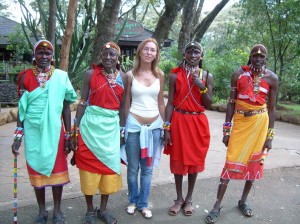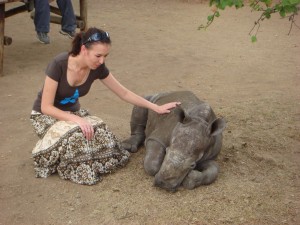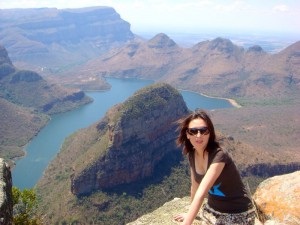 ASTANA – While more and more foreigners are moving to Kazakhstan, tales of Kazakh expatriates abroad are still rare. Astana native Raushan Makhmutova, who has been working abroad since 2006, is one of Kazakhstan’s relatively small number of global workers and travellers.
ASTANA – While more and more foreigners are moving to Kazakhstan, tales of Kazakh expatriates abroad are still rare. Astana native Raushan Makhmutova, who has been working abroad since 2006, is one of Kazakhstan’s relatively small number of global workers and travellers.
There are dozens of pins on Makhmutova’s personal map of travels, marking places from Western Europe to Southeast Asia to South Africa. Though she has worked abroad for years now, she still plans to bring her experience back to her home country.
“I have thought of working in Kazakhstan,” she said. “It’s my homeland. But I will seriously think of that when I get enough experience to be useful in my country, and after I have travelled enough. I am still full of ideas of new places to visit; I still have too much desire to explore the world. I love getting to know places I had only seen in books or movies, tasting new cuisines and learning new customs. I love meeting new people and learning how our cultures are alike and how they are different,” Makhmutova said.
She started working abroad when she got a job with Bellzone, a company that develops iron ore and mineral assets in West Africa, in 2006. She first worked for the company in Kazakhstan, then got an offer to work in the Democratic Republic of Congo from one of her former colleagues.
“At that time, I was working as an interpreter back in Kazakhstan. But in Congo I started my first job as a document controller. Later, when the project was over, I started working as project coordinator in Ghana for a Canadian gold mining company called Kinross. I always work [monthly] shifts. I gained a lot of experience in construction, though I do not have any special education in it. International companies value experience and your will to work and learn.”
In her current position, Makhmutova juggles responsibilities including overseeing construction, tracking and reporting expenditures, managing schedules and troubleshooting site problems. “I am multitasking,” she said.
Working abroad may be exotic, but it can also be dangerous, Makhmutova said. “I’ve worked on projects in Zambia, Guinea, Cameroon, Eritrea. Some of them were gold mines, iron ore, cobalt. We work in quite harsh conditions, living in camps, with none of the entertainment we are used to back at home. Normally, it’s very hot, with lots of insects. I’ve already had few spider bites and one malaria case. But I’ve learned safety measures, so it’s not a big deal any more.”
“I also worked a lot in India and China and I loved these countries; they have such a rich culture and many beautiful places,” Makhmutova said. “I’ve done a lot of travelling for work and sometimes for days off, too. I have been to Kenya, Zimbabwe, Tanzania, Zambia, Mozambique, South Africa, Congo and Botswana. I went to Kenya because I heard it has great beaches, with sand so fine it feels like powder. I visited Masai tribe villages [and] went to Kilimanjaro. I even managed to squeeze in a male beauty contest called Mr. Shambala in a town called Ukunda, south of Mombasa. It was fun!”
She has seen some of the world’s most incredible sites, but also witnessed what life is like off the beaten track. “I went to a bush village. I’ve never seen a village living as a family before. If you earn some money, you buy food for the whole village: they work together and share whatever they get,” Makhmutova said.
Working so far from one’s culture can present major challenges, the traveller said. “Working abroad gives me a lot of challenges. One of them is, of course, the difference in mentality and culture. The standards and corporate culture are different. Then language, technical language. To know all the things in construction and management in English is not easy. You must start thinking in English. I love working abroad because it gives me a chance to work with people from different countries, learn from them, share my experience; to be a part of multicultural process and develop my professional skills as a manager.”
Companies are striving for diversity in their workplaces, Makhmutova said, and actively recruiting workers from different backgrounds. “The reason for this is that having a diverse workforce has a number of benefits to businesses, such as having more flexibility and a greater ability to remain competitive in a global market,” she explained.
Of course, Makhmutova also occasionally runs into stereotypes about Kazakhstan, as well as other nations.
“What do people in Africa know of Kazakhstan? Truth be told, almost nothing. They all know Russia or the Soviet Union. I am always asked: ‘Kazakhstan? Where is that? Is that in Russia?’ Unfortunately, many people know about my country from the movie ‘Borat.’ They even ask: ‘Kazakhstan?! Do you know Borat?’ But there have been some changes over the [recent] years. Kazakhstan has become a respected country in the world arena and more people know about us and are willing to visit our country. We showed good results in the London Olympics in 2012. So now I don’t see amusement and surprise on people’s faces when I talk about Kazakhstan.”
She also does her part to burnish her country’s image. “I never miss an opportunity to tell people about my country. I show pictures, even random ones of streets, restaurants, shopping centres, friends and parties to show them that what they know about Kazakhstan is probably a stereotype. On my last trip to Western Africa, I did a presentation and a short movie about Kazakhstan and Astana. With the help of my friends, I made movie about the everyday life of people, how we spend our days off, where and what we eat, what cars we drive, our traditional food … At the end of the movie, all my friends send regards to Africa and my foreign colleagues. It was fun and my multinational audience really enjoyed the movie. I hope I changed their idea of Kazakhstan.”
 Her home country is often on Makhmutova’s mind. “When I am away from home, I do feel a bit homesick. But I always remember that I will go home soon and there is not much time to learn something new, to see places that I might not see again. That makes me appreciate and enjoy every moment of my travelling.”
Her home country is often on Makhmutova’s mind. “When I am away from home, I do feel a bit homesick. But I always remember that I will go home soon and there is not much time to learn something new, to see places that I might not see again. That makes me appreciate and enjoy every moment of my travelling.”

